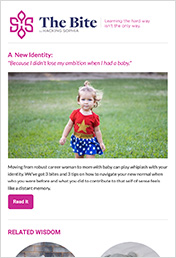“I really wasn’t thinking clearly during the first year of my baby’s life.”
WHY
The Cram it all in Years (CIAIY) combine lack of sleep, emotional and physical exhaustion, stress…ok, ok, you know it. One of the results is what women describe as brain fog. Yes, brain fog is real, and guess what? It’s called Brain Fog. It’s described in many ways with themes of having difficulty focusing, lack of mental clarity, having a hard time concentrating or a hard time getting ideas or the right words out. It’s associated with a decline in executive function, attention and memory. Sleep can help, but tell that to your little one(s). So here are a few bites that may actually fit into your world:
What To Do (Bites)
-
Reduce mental clutter
Your brain may be multitasking, creating mental chaos, which in no way helps with brain fog. Multitasking, something that we’re pretty proud we can do effectively, can be your worst enemy when you are experiencing Brain Fog. Silence distractions: phones, emails, apps, watches that buzz. If something unrelated pops into your brain (crap, I forgot to buy a birthday present), write it on a holding pad to deal with later. Protect your brain by dividing these realms for now.
-
Write down points
Writing things down is a sorting mechanism, providing order to chaos. So, when you’re in a meeting, even 1:1s, write down your thoughts, capture key words of what is being said and what’s going through your mind. It helps to remind you of the important thoughts being communicated (if you are feeling like your memory is temporarily shot), can be an organizing tool and frame of reference in the conversation, and it provides focus.
-
Use clarity confirmation techniques
You know these from when you were starting out. Lines like “so, what I’m hearing you say is x, is that correct?” or, “so we’re on the same page, here’s what I need you to do…” Clarifying statements serve to align so there’s no miscommunication in the fog. They also give you a bit of room to think and confirm you’re on the same page.
I felt like I was more a liability than an asset to my company in the early days postpartum. I felt like I had zero short-term memory, I made mistakes all the time, and generally felt brain-dead. So not me – it rocked me to my core.
Tips
-
Don’t apologize for Brain Fog or even raise it. First, it’s probably less apparent externally than it feels internally. Second, you don’t want to anchor that narrative to your thinking. Third, it will shape how the receiver sees and hears you. It may undermine rather than elevate you.
-
Create brief transition spaces, e.g. using the walk from your desk to wherever you’re meeting someone to declutter your mind. You could do deep breathing, put on Headspace, listen to music. A short interval of something mind-clearing will do.
-
We can’t not say this – improve sleep efficacy. At a minimum, think about nighttime screen time. It’s fun to look at cute pics of our kids at night to remind us of the best of it, but keep the mind cluttering to a minimum. If your mind is racing before you go to sleep, think about what is triggering that and work to remove or quiet those distractions. And definitely avoid screens if you’re doing middle-of-the-night feeds. Between the blue light and seeing emails and texts, you’re dooming your chances of falling back to sleep.
Hope you found this helpful! Got a topic you’d like some wisdom on? Let us know.




